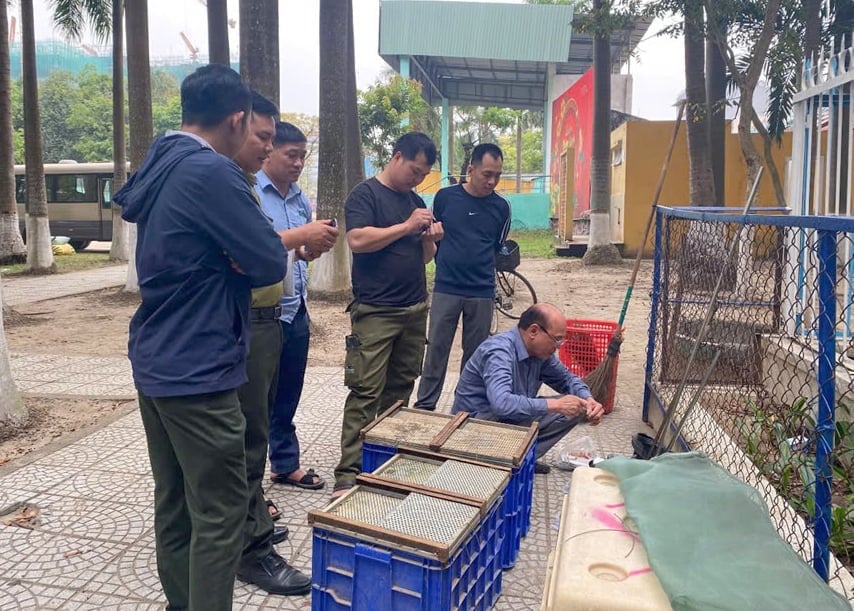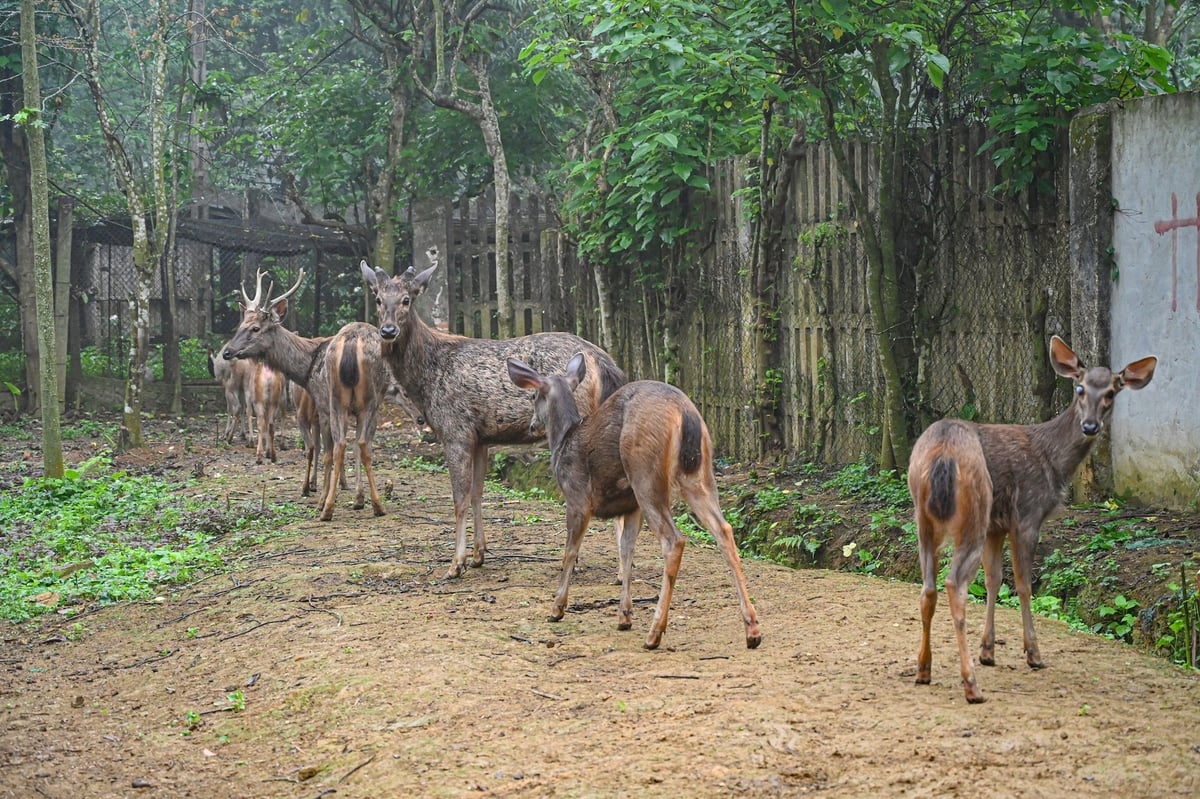May 25, 2025 | 20:33 GMT +7
May 25, 2025 | 20:33 GMT +7
Hotline: 0913.378.918
May 25, 2025 | 20:33 GMT +7
Hotline: 0913.378.918

Authorities carried out the handover and reception of the wild animals. Photo: Phu Cuong.
On the morning of April 11, with technical support from the Wildlife Conservation Center of Vietnam and the Da Nang City Forest Protection Department, the rescue team from Cuc Phuong National Park safely transferred 18 individuals of endangered and rare wild animals from Thanh Khe District, Da Nang City to the Rescue, Conservation, and Organism Development Center of Cuc Phuong National Park.
The 18 wild animals included: 12 Sambar deer (Rusa unicolor), 2 Northern pig-tailed macaques (Macaca leonina), 3 Stump-tailed macaques (Macaca arctoides), and 1 Indian python (Python molurus).
Mr. Le Manh Hung, Deputy Head of the Da Nang Forest Protection Department, stated: “These 18 wild animals were handed over by the Thanh Khe District People's Committee. We chose to entrust them to Cuc Phuong National Park with the goal of sharing and supplementing genetic resources. It is also part of our effort to prepare the healthiest wild individuals to support future plans for the rewilding of some endangered species that are at risk of extinction in the wild.”

The wild animals were brought to Cuc Phuong National Park. Photo: Phu Cuong.
Mr. Le Phuong Trieu, Deputy Director of Cuc Phuong National Park, stated that currently, many organizations and individuals are transferring rare and precious wild animals to Cuc Phuong’s Rescue and Conservation Center in particular, and to conservation facilities across the country in general. This is a positive sign, indicating that the government's efforts in wildlife conservation are being widely spread and increasingly embraced by the community.
According to Mr. Trieu, transferring wild animals to facilities that meet the necessary conditions for care and conservation is not only an act of responsibility in the conservation field but also carries profound humanitarian significance. It offers many wild animals the chance to return to their natural habitats.
Cuc Phuong National Park is Vietnam’s first national park and is known as the “protection capital” of the country. The park is currently home to thousands of individuals belonging to various endangered and rare wildlife species, where they are being cared for, nurtured, and protected.
The conservation programs at Cuc Phuong are of regional and global significance. Some notable ones include the Endangered Primate Conservation Program, the Turtle Conservation Program for terrestrial and freshwater turtles, and the Carnivore and Pangolin Conservation Program.
With a nearly 200-hectare semi-wild enclosure area, the park aspires to be an ideal haven for rescue, rehabilitation, care, and long-term conservation, offering a chance at “revival” for many individual wild animals.
Translated by Kieu Chi
/2025/05/25/4127-3-073637_820.jpg)
(VAN) Thanks to the promotion from an FAO-implemented project, vegetable production in greenhouses in Moc Chau has seen strong development, from 1.5 hectares in 2021 to nearly 50 hectares in 2024.

(VAN) FAO has recently supported USD 140,000 to implement the project 'Risk mitigation human-animal interface risks through disease control initiatives in pig farming.'

(VAN) The People's Committee of Tra Vinh province has approved an adjustment to the investment policy for the Green Hydrogen Plant project, increasing its area to approximately 52.76 hectares.
![Reducing emissions from rice fields: [2] Farmers’ commitment to the soil](https://t.ex-cdn.com/nongnghiepmoitruong.vn/608w/files/news/2025/05/05/dsc08881jpg-nongnghiep-140632.jpg)
(VAN) Clean rice cultivation model in Thuong Tan commune, Bac Tan Uyen district, is assisting local residents in achieving sustainable agriculture by substantially reducing costs, increasing productivity, and protecting the environment.

(VAN) At the conference to disseminate Resolution No. 68, AgriS introduced its digital agricultural ecosystem and reaffirmed its commitment to accompanying the Government in promoting private sector development and sustainable agriculture.

(VAN) 'Blue Ocean - Blue Foods' initiative is designed to restore marine ecosystems and establish sustainable livelihoods for local communities by cultivating a minimum of 1,000 hectares of cottonii seaweed in the first three years.
/2025/05/21/4642-3-112707_603.jpg)
(VAN) The V-SCOPE project has made direct contributions to three out of six pillars of the Comprehensive Strategic Partnership between Vietnam and Australia.